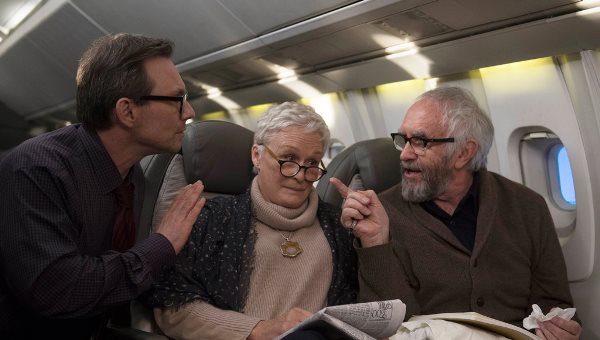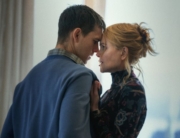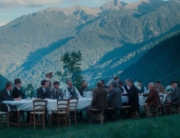
From left, Christian Slater, Glenn Close, and Jonathan Pryce in The Wife (Graeme Hunter/Sony Pictures Classics)
Male vanity. Pompous platitudes. Self-serving fibs. No one can respond to these irritants with a look of beatific bless-your-heart scorn like Glenn Close, and she gets plenty of chances to wield it in Swedish director Bjorn Runge’s adaptation of Meg Wolitzer’s 2003 novel. Close delivers a tough but sharply understated performance in this classy melodrama, which observes family secrets unravel and then implode under bourgeois duress of the most haute sort. An old-fashioned, tony chamber piece on the surface, the film has surprises below.
Close plays Joan, the titular long-suffering spouse to blowhard literary lion Joe Castleman (Jonathan Pryce). We first meet this 60-something couple uneasily tossing in their marital bed before the phone rings, with a Swedish accent on the line announcing that Joe has won the Nobel Prize in Literature. What they do before and after this momentous call reveals a lot about their 40-year relationship, which is explored in flashbacks to their youth when (the already married) Joe was Joan’s college writing professor and wooed her away from her own writing career. Now decades later in 1992, Joe is a star, but Joan is feeling depleted and angry after years of supporting the Great Man.
So is their son, David (Max Irons), an aspiring writer himself who desperately wants his father’s attention, and the family seethes and snipes at each other on the trip to burnished, ritzy Stockholm, where Joe flirts with a pretty minder. As the Nobel ceremony gathers steam, Joan grows colder and more withdrawn, Joe more self-important and demanding. Confrontations mount.
Director Runge takes calculated risks that propel The Wife beyond the high-toned, polite affair it could easily have lapsed into. Beneath dialogue that can feel a little too direct, characters unmask themselves as more tough, shrewd, or vulnerable than they first appear. Handheld camerawork heightens emotional scenes in elegantly appointed rooms with a sense of Bergmanesque anguish.
And some unusual casting choices raise the antennae (and ante). Close’s real-life daughter, Annie Starke, plays the young Joan with an awkward innocence that throws into relief how guarded the adult Joan has forced herself to become. It’s doubtful that an American director would cast Christian Slater as a literary biographer and put him up against Close. But Runge has, and Slater is very believable as a sleazy but canny operator who uses charm to get under Joan’s skin. Finally, Elizabeth McGovern appears in a haunting cameo as a hard-drinking writer—a woozy caution on the dangers of literary life.
The revelations at the end may not come as an earth-shattering shock, but smaller-scale disturbances along the way give this film, which has an impeccable pedigree, more of bite than its glossy surface suggests.






Leave A Comment